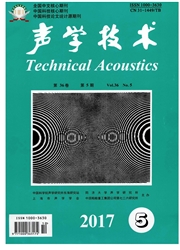

 中文摘要:
中文摘要:
低频噪声对人的主观影响越来越引起人们的重视,本文采用正交分析方法,研究了低频噪声频谱中不同频率下降点,不同下降斜率,不同频率调制因子和用于调制信号的窄带噪声不同截止频率四个因素对主观低沉度、有调感、粗糙感和烦恼度的影响。主观评价采用了分组成对比较法和参考语义细分法。研究结果表明,不同频率调制因子对粗糙感的影响较大。不同截止频率对有调感和低沉度的影响比较明显。在进行主观烦恼度的统计分析时,需要考虑人群分类的影响,对于不同的人群烦恼度的影响因素会有所不同。
 英文摘要:
英文摘要:
In this thesis, an orthogonal array analysis method is applied to the study of sound quality in order to systematicly investigate the influence of frequency spectrum characteristics of low-frequency noise including different drop points and drop slope in the frequency spectrum, different ranges of frequency modulation and different cut-off frequencies on subjective sensations, such as annoyance, subjective low-powerful, tonal and rough sensation. Experiment of subjective evaluation and analysis is carried out with grouped pair-wise comparison and reference semantic differential method. The results show that the different range of frequency modulation is remarkable to subjective rough sensation and the different cut-off frequency is significant to subjective low-powerful and tonal sensation. When annoyance is discussed, it is found that the people should be grouped, and different factors influence the different grouped-people's subjective annoyance.
 同期刊论文项目
同期刊论文项目
 同项目期刊论文
同项目期刊论文
 期刊信息
期刊信息
